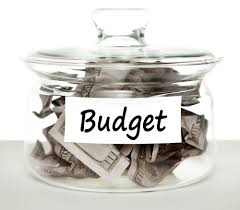A Budget: Get Yours Today!
We talk a lot about budgets at Anchor Advisors. In fact, we sell them so much you might think we stand to make a commission on them!
“This budget here … it’s the answer to all your financial woes. Look at all the bells and whistles. It can keep your business on track by helping you prioritize your spending and focus on increasing your revenues.”

Budgets can be a hard sell. Sure, they have tremendous value, but selling the fact that people need to commit the time and energy to first doing them – and then following them – is a challenge. We understand. It does take time and discipline, but when you see, and enjoy, the year-round benefits of a budget, you will wonder how your company ever existed without one.
Christine VanderNaald, operations manager of Solving IT in Chicago, was recently “sold” on the idea of budgeting. Only three months into her year, she is now seeing how the budget is impacting the company’s bottom line and performance. “The value of having a budget is that it provides a benchmark for us when we review the financial history of the company each month,” she said. “Then, we look at our forecasts and can then get an indicator of the company’s positioning, which is helpful for decision making.”
The budget has also helped the company control its impulse spending, she noted. “There is more awareness on where every dollar is to be allocated,” VanderNaald said. “If we want to spend money on something and there are no allocated dollars in the budget, then we have a conversation of where in the budget we can redistribute funds. Even with this process, we still might spend the money but at least we’ve had the discussion and are aware of the implications.”
Solving IT’s experience with budgets is common; once you do one and realize the benefits, you’re hooked. Still, too many small business owners can’t find the time or energy to do a budget. But do you have time and energy for your business to make money? Yeah, we thought so …
Budgets involve much more than a once-a-year commitment. For real value, you have to use it every month. In order to do that, you must create your budget in a certain way. It must include:
- Explicit assumptions about the key numbers in your business (e.g. number of leads, closing ratio, average sale, etc.).
- A format that matches your reporting (if you want to look at your numbers monthly, your budget has to be laid out monthly).
- A format that matches the chart of accounts in your accounting system. This way you can easily compare your actual data to your budget and look at where you hit and where you missed.
Once you have a couple of months of data to look at, it’s worth comparing those actual results to what you predicted in your budget. Where did you hit (guessed right) and where did you miss (guessed wrong)? The difference between what you budgeted and your actual results are known as “variances”. Run your finger down your Income Statement and look at what categories had the highest “variances”. What happened here? Sometimes it’s just timing, an item that only occurs once or twice a year and it showed up all in one month, but you budgeted a little each month. Other times you will find places where your spending is just a lot higher (or lower) than you thought it would be. Why is that? What changed?
Next let’s look at the important numbers. Are your sales over or under budget? Again, why? Did you get more leads than you predicted? Is that going to continue, or was it due to some kind of one-time event (trade show or promotion)? Are you closing them at about the rate you expected? Is your average sale higher or lower than you thought?
If your sales are under your budget, then you need to make sure that your expenses are under budget too in order to protect your profits. Do you need to reduce expenses to align them with your sales performance? This is always a judgment call. How do you decide that it’s time to make cuts, or more sales are right around the corner? Evaluating your budget and results monthly forces you to look at the data and decide.
Now that you’ve reviewed your major categories, let’s look at other assumptions. Are you thinking about hiring new people? Are the sales there to support new hires (or leads to support a new sales hire)? Thinking about more office space, or investing in new equipment? What are the key indicators that tell you that those investments are needed? Are you hitting those numbers consistently? Then invest with confidence.
If you are consistently looking at your numbers, and really looking at why they are better or worse than your projections, you create a frame for any decision in you business. It can even set your priorities. If sales are behind, you need to address that. If they are ahead, but profit’s not, then expenses are out of control… You get the idea.
Your budget provides a measuring post by which you can compare your actual results and decide how you are doing. It also provides you with a tool to play “what if” and decide if you like the results. If you’d like to try it for your company click here to download a copy of our budget file and an ebook that guides you through its use, and let us know what you think.
Photo credit: CarbonNYC [in SF!]

